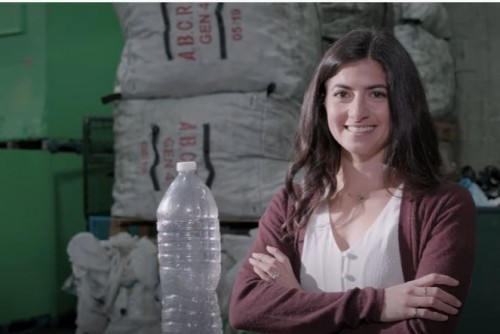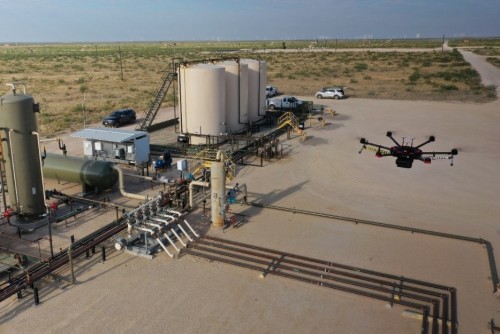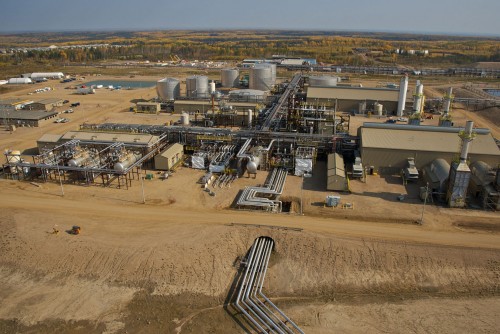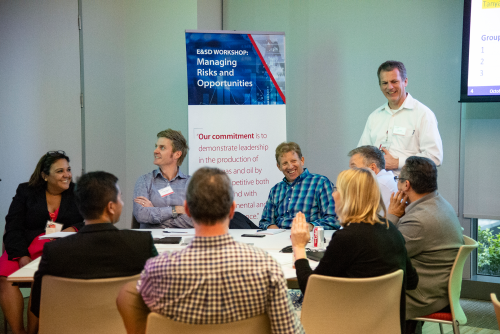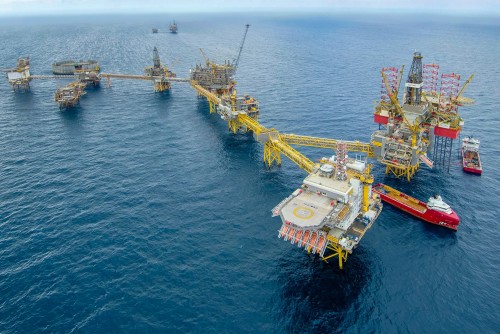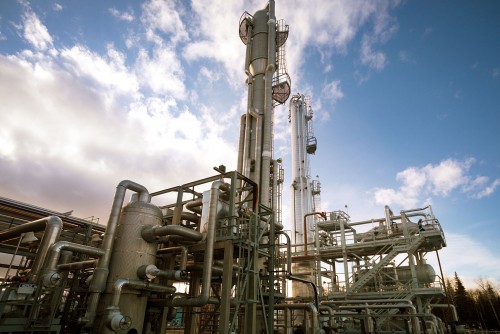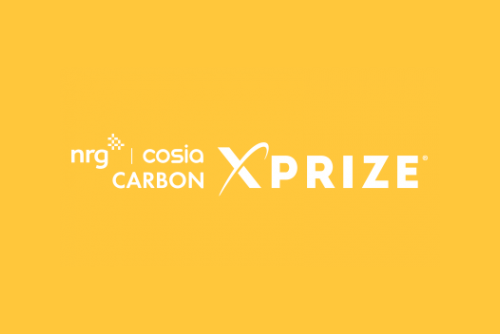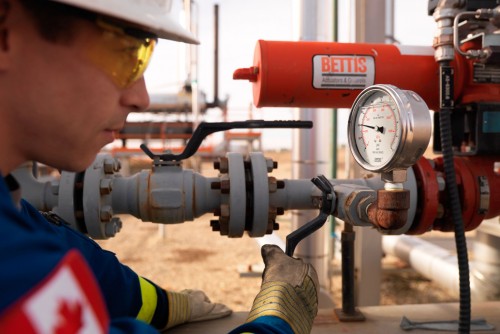External Collaboration and Engagement
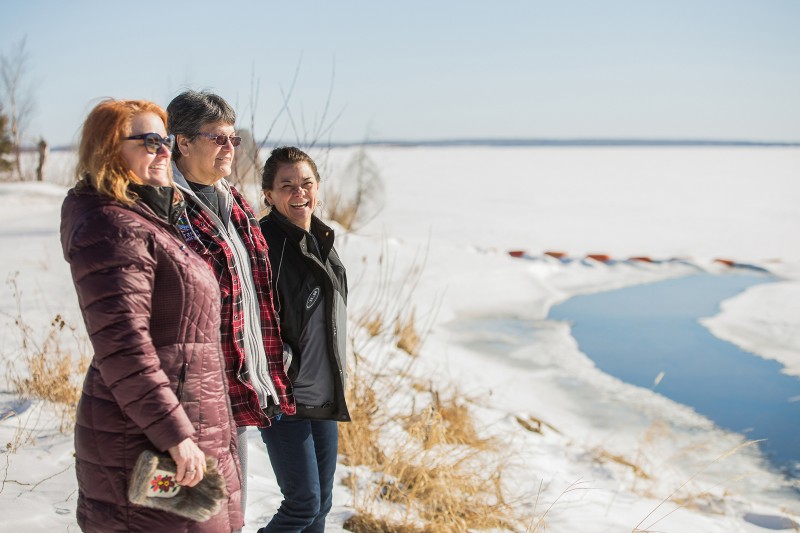
External engagement is important to understanding the issues and challenges relating to climate and the evolution of policy development. Current actions include:
- Developing methane and shale development communications.
- Taking part in global legislation and regulation development.
- Engaging with stakeholders, including investors, on climate-related risks.
Supporting Industry Dialogue
We actively work with different organizations and associations around the world to enhance our understanding of the issues and trends facing our industry and company. The benefits we receive from trade and industry associations range from best practice sharing to technical standard setting and issue advocacy. We do not always agree with all positions taken by the organizations that we work with. For example, we may not always agree with the positions they take on climate change or regulatory reform. In these cases, we make our views known and seek to influence their policy positions. We have strong governance around our association activities and annually report on trade association memberships with dues more than $50,000.
We are members or sponsors of a number of external groups that support our efforts to manage climate-related risks. Further, we work with our trade associations to ensure alignment with our climate change position.
The American Petroleum Institute (API) Climate Committee addresses climate change issues affecting the U.S. oil and natural gas industry. The group oversees the development of API’s Climate Position, Climate Policy Principles and industry initiatives. The group developed the recent Climate Action Framework, a combination of policies, innovation and industry initiatives to reduce emissions from energy production, transportation and use by society. We are active in many API committees that can also involve or address climate-related issues, and we work to contribute our perspective in alignment with our positions and actions.
The American Exploration and Production Council (AXPC) Climate Change Group addresses climate change issues affecting the U.S. exploration and production sector of the oil and natural gas industry. The group has helped to develop AXPC’s climate policy and principles, its ESG Metrics Framework and Template, and its position on methane regulations.
IPIECA established its Climate Change Working Group in 1988. Since then, the group has monitored climate science and policy discussions, engaging with international governmental bodies and other stakeholders. It is not an advocacy body and does not engage in lobbying on climate or other issues. In 2021, IPIECA clarified its purpose on providing best practice guidance on GHG emissions monitoring, reporting and management to improve industry performance. ConocoPhillips is aligned with IPIECA on its effort to bring together members of industry to knowledge share on GHG reduction efforts.
IPIECA participates in the Intergovernmental Panel on Climate Change (IPCC) and the United Nations Framework Convention on Climate Change (UNFCCC) and provides IPIECA members with reliable and timely information about these and other international processes dealing with climate change.
We are sponsors of the MIT — Joint Program on the Science and Policy of Global Change program which supports efforts to:
- Improve knowledge of interactions among human and natural Earth systems, with a focus on climate and energy, and of the forces that drive global change.
- Prepare quantitative analyses of global change risk and its social and environmental consequences.
- Provide independent assessments of potential responses to global risks, through emissions mitigation and anticipatory adaptation, contributing to improved understanding of these issues among other analysis groups, policymaking communities and the public.
- Augment the pool of people needed for work in this area by the education of graduate and undergraduate students in relevant disciplines of economic and Earth science analysis and methods of policy assessment.
An interdisciplinary team of natural scientists, social scientists and policy analysts supports this mission, with their efforts coordinated through the maintenance and application of a set of analytical frameworks that integrate the various components of global system change and potential policy response.
IHS Markit, now part of S&P global, hosts forums where member companies can discuss global climate change and clean energy research and its implications for policy. They provide a wide range of research products to ensure that members are up to date with current developments around the world.
Additionally, we have worked with the following groups:
- International Oil and Gas Producers Association (IOGP)
- U.S. Business Council for Sustainable Development (USBCSD)
- Socially responsible investors (SRIs)
- Nongovernmental organizations (NGOs)
Our engagement with investors has focused on climate-related risks in many one-on-one meetings and periodic conferences, such as with the Interfaith Center on Corporate Responsibility. We have also engaged on climate-related issues and sustainability risks with institutions such as Moody’s, Fitch and S&P.
Other groups we have joined or in which we are participating include:
- World Bank Zero Routine Flaring by 2030: Initiative that aims to bring together governments, oil and gas sector and development institutions to address flaring.
- E&P Net-Zero Principles Roundtable: Facilitated by Ceres, a small representative collection of financial sector, E&P oil and gas sector and NGOs, seeking to define what it means to be a Paris-aligned exploration and production company.
- Net-Zero Business Alliance: Initiative from the Bipartisan Policy Center to bring together business leaders that represent an affirmative and pragmatic voice in the climate solutions debate and to work with governments to advance an aggressive climate strategy that is grounded in engineering, commercial and economic realities.
- Net-Zero Company Benchmark: Engaging with Climate Action 100+ on their assessment of our energy transition progress.
- Canada’s Oil Sands Innovation Alliance (COSIA): Group of oil sands producers, of which we are a founding member, focused on accelerating the pace of improvement in environmental performance in Canada’s oil sands through collaborative action and innovation.
- Oil Sands Pathways to Net-Zero Initiative: Alliance of Canada’s top oil sands operators working toward achieving net-zero GHG emissions by 2050.
- International Emissions Trading Association (IETA): Non-profit business organization created in 1999 to establish a functional international framework for trading in greenhouse gas emission reductions.
- Climate Leadership Council (CLC): International policy institute to promote a carbon dividends framework in the U.S.
- Carbon Pricing Leadership Coalition (CPLC): Global voluntary partnership to share and expand the evidence base for effective carbon pricing policies.

